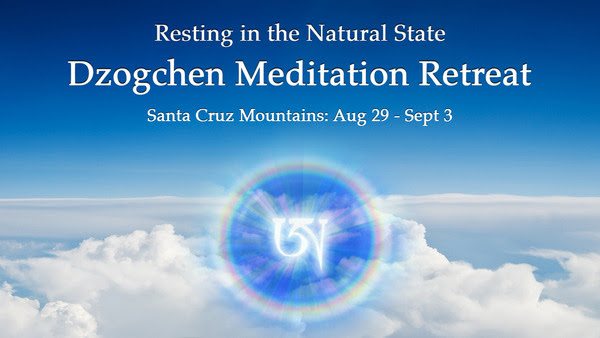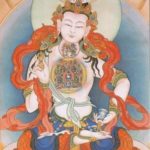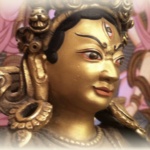What is Dzogchen Meditation?
“Dzogchen is one of Tibetan Buddhism’s most treasured practices for awakening to intrinsic wisdom. Dzogchen means ‘Great Perfection,’ which refers to the natural goodness at the heart of every person. Its goal is to cultivate wakeful, authentic presence.
One of the greatest challenges to well-being is the untrained mind. It is full of conditioned scripts and distracted. It may be so deeply habituated, that the experience of freshness and clarity are difficult to access. Buddhism points out that an untrained mind is plagued by mental afflictions such as anger, grasping, insecurity, depression, and jealousy. Even though most people spend their lives in such states, this is not mind’s ultimate potential. Mind also has a deeper aspect, known as ‘the nature of mind.’
The ‘nature of mind’ is an innermost quality of wakefulness, loving-kindness, and openness. According to Dzogchen teachings, these qualities are the enduring, ever-present, most authentic expression of being. Even though this nature of mind may be temporarily eclipsed by mental afflictions, those afflictions cannot dilute mind’s intrinsic quality. That quality, a natural goodness, is always there, waiting to be harvested. This is why Dzogchen meditation is practiced.
Meditation is a life-long practice. So, having a sustainable practice is crucial. This is why the quality of meditation over the quantity of meditation is valued in Dzogchen. For example, one can begin with shorter sessions and gradually extend them. Also, the practice of silent sitting meditation can be interspersed with breathing techniques. Silent meditations can be alternated with chanting meditation or physical meditation techniques.
Dzogchen meditations incorporate practices for body, speech and mind. Therefore the notion of ‘mind’ is a holistic one. Body, speech and mind are known as the three gates because they are the gateways to recognizing awareness. This is an important element of Dzogchen meditation because working with the posture and physical practices can greatly reduce the obstacles to meditation. But the body is not just a means to an end in Dzogchen meditation. The body itself is pervaded with buddha-nature. It has a natural wisdom and purity. Even though it is impermanent, it is also an expression of the creative compassion of ultimate reality. Therefore the body itself is a field of revelation and insight into authentic presence.”
(Excerpted from the Tibetan Yoga & Dzogchen teaching with Pema Khandro)
What is the Dzogchen Meditation Retreat?
This five-day retreat takes place annually in the redwood forest, in Santa Cruz California. This retreat is practice oriented. It focuses on deep relaxation and supported meditation practices. Since it is the most important event of the year for the Buddhist Yogis Sangha, students come from all around the world to attend.
There are still a few spaces left for this year’s Dzogchen Retreat with Pema Khandro Rinpoche. Register by July 15th for Early Bird Tuition.

Join Pema Khandro and the Community of Buddhist Yogis for a week of restorative, peaceful meditation.
Retreat into the beautiful redwood forest, unwind with restorative yoga, experience deep quiet, enjoy vegetarian cuisine, converse with fascinating people and best of all, receive Buddhism’s most profound teachings.
Pema Khandro is a Buddhist teacher specializing in the contemplative practices of Tibet’s Buddhist Yogis. Read more about the retreat teacher – Pema Khandro here – Pema Khandro’s Biography
Click here for Retreat Schedule and Details
Register Now for Early Bird Tuition
Members receive additional Discounts
Ngakpa International
Info@BuddhistYogis.org | www.BuddhistYogis.org



